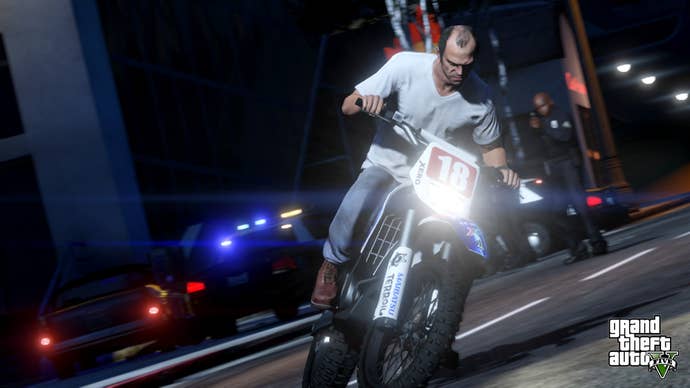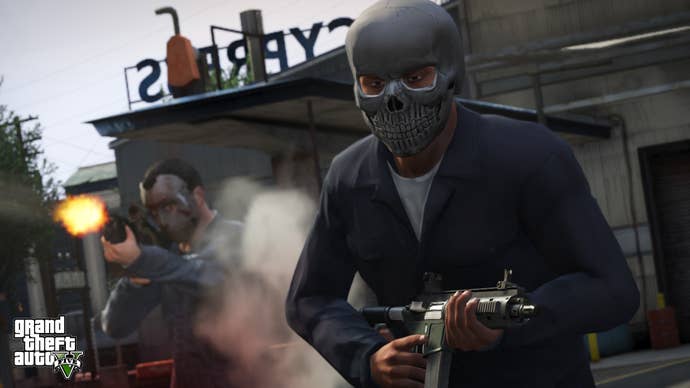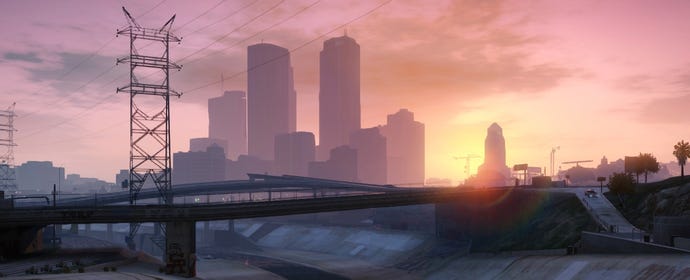Grand Theft Auto and the Fine Art of Hyperbole
Rockstar's latest open-world title is out next week. Are you excited or cautious?
This article first appeared on USgamer, a partner publication of VG247. Some content, such as this article, has been migrated to VG247 for posterity after USgamer's closure - but it has not been edited or further vetted by the VG247 team.
Do you know? Do you know? Have you heard the news? Grand Theft Auto V is out next week!
Of course you knew that. It's all but impossible not to know that, even if you have no interest in the series whatsoever, because Grand Theft Auto has the dubious honor of being one of the most heavily-marketed games in the modern industry, with a significant proportion of the latest game's supposed $265 million budget being blown on promotion, PR and other marketing-related pursuits.

It's certainly paid off for Rockstar, too, since the company appears to, most of the time anyhow, have both the press and public wrapped around their little finger. Grand Theft Auto V has, in the last year, been one of the few games for which a significant number of outlets seemed to think that "Developer Releases New Screenshot (Singular)" is grounds for a full news story. And while there's not necessarily anything wrong with that if the audience for those outlets demands such stories, it's a pretty clear sign of the disproportionately large amount of attention the industry as a whole pays to the series, sometimes at the expense of some smaller stuff.
We don't know yet if Grand Theft Auto V will be any good or not -- you'll have to wait until our review and related coverage next week to find that out for sure. But there's this kind of unspoken assumption -- particularly among longstanding fans of the series and those who have consistently bought into the hype -- that there's absolutely no doubt that it will be good. And that's a bit of a dangerous road to start down -- one that Rockstar has fallen foul of to a certain degree in the past.
I am, of course, referring to Grand Theft Auto IV.
The sixth Grand Theft Auto game (eighth if you count the two PSP spinoffs; tenth if you count the two expansions for the first game, but let's not be picky) certainly performed well critically. At present, both the PS3 and Xbox 360 versions sit at a very comfortable Metascore of 98 each, making the console versions, between them, the most positively reviewed video games of all time. (The PC version, released considerably later than the console versions, performed slightly less well; its Metascore of 90, due to a sloppy port and reliance on the loathed Games for Windows Live system, drags the game's average across all three platforms down to 95.333, which is still perfectly respectable but not quite as impressive.)

Talk to someone about Grand Theft Auto IV today, though, and you're just as likely to find someone who was disappointed with the game as you are someone who was impressed with what it was doing. This isn't in itself unusual, as tastes vary significantly between individuals, of course -- just look at our PS3 roundup from yesterday for a small-scale example -- but with Grand Theft Auto IV in particular it seems that the feelings of everyone -- press and public -- aren't really in line with that sense of "universal acclaim" that a 98 Metascore implies.
The most common criticism of Grand Theft Auto IV makes use of that overused, oft-misused term of "ludonarrative dissonance," used in this context to describe the dissonance between the fairly serious, personal story the game was trying to tell and the ability to stand in the middle of a road hurling grenades at passing pedestrians -- not to mention the fact that there weren't really any long-term consequences for "misbehaving" in the game world.
Rockstar was in a difficult position, though. Nico's story, taken on its own merits and divorced from its context as the plot to a Grand Theft Auto game, is an interesting one that involves some great characters. It was a story the team clearly wanted to tell and, for the most part, told well. At the same time, though, the Grand Theft Auto series had always been known for providing the player with the ability to drop everything and indulge in some ridiculous carnage any time they saw fit -- not exactly in keeping with the tone set by Nico's narrative.

The series as a whole has, in fact, had this dissonance between the narrative and the freeform chaos ever since Grand Theft Auto III; the difference with Grand Theft Auto IV was that its structure emphasized the dissonance rather than attempting to play it down or make light of it. GTAIII and its successors regularly encouraged you to go off-piste with hidden Easter eggs, collectible items and arcade-style "Rampage" challenges similar to those we would expect from a Saints Row game these days; GTAIV, meanwhile, took itself a lot more seriously, and thus it just didn't feel "right" to start blowing things up with gay abandon.
You could argue, of course, that this is actually a sign that Rockstar had done a very good job of making the world, setting, narrative and characters truly immersive -- if it doesn't feel "right" to let the protagonist start causing trouble, that's surely a sign that both he and the world are things you actually care about -- but, for some, it went against the spirit of what they felt the series was about. And this, in turn, led to some people feeling that Grand Theft Auto IV was perhaps not what it could have been -- certainly not, going by Metascores, the best game of all time.
Potential disparity between the initial surge of overwhelmingly positive reviews and public opinion over a long period isn't the only reason overhyping something can be risky, however. Another important consideration is what happens if the hyperbole starts too early. Begin promoting something that is a year or two off and you run the risk of everyone being sick of the sight of it by the time it actually hits store shelves; start promoting it too late and people will have already committed themselves to other experiences.

Again, this is something that Rockstar generally does well -- look at how much excitement there has been in the past every time the company released a GTAV trailer, for example -- but there's still a risk of burnout, especially as the game still isn't out yet. Just look at the reactions the USgamer team had to share about the gameplay trailer a while back -- several of us were already a little skeptical and cautious about the game, and a number of commenters concurred. Two months have passed since then, and hype is continuing to build and build and build, with many people jokingly (and, in some cases, not so jokingly) claiming they'll take the day off work to play the game. I worry that as people get more and more excited, GTAV can't possibly live up to the expectations we, as a collective, are saddling it with.
On the other hand, it could pleasantly surprise us and genuinely be the most complete, well-crafted, well-realized game ever created. We just won't know until it's actually in our hands and we're playing it. Stay tuned to USgamer next week for our coverage and review, and we'll find out together for sure.








